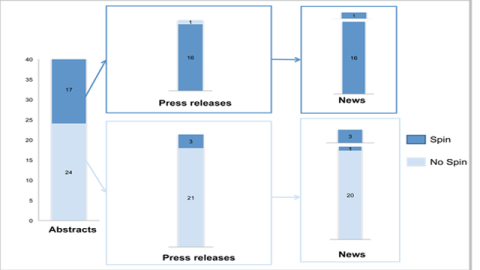Breaking news from the department for the bleeding obvious

Two major papers have recently been published that may or may not surprise you. Please excuse the sarcy title, in all seriousness these are fantastic papers that provide evidence for massive problems facing the scientific world today. They are both well worth reading in full, the key points are outlined below.
1.) 47% of press releases and 40% of abstracts reporting the results of randomized controlled trials contain spin. This spin translates directly to news coverage, a study published in PLoS Medecine found. For analysis check out Christie Wilcox’s excellent blog over at Scientific American. Note the failure of paywalled content to be accurately described in abstracts (often the only freely available part of research) when considering the second study.
2.) The findings of systematic reviews lie utterly ignored by policy makers and doctors, according to a systematic review of systematic reviews (did someone say meta?) published in the British Medical Journal. The authors cite access problems (such as pay walls) as a primary reason for the failure of evidence based research to have the impact it should have on our lives. This research should cement the idea (illustrated in my last blog post) that it’s important to go out and study the evidence for yourself. If you rely on mainstream media coverage you will remain misinformed. It is of course a truism that most research findings are false, the title of “the most downloaded technical paper that the journal PLoS Medicine has ever published” (Ioannidis, 2005) a paper that has been cited over 1000 times. Valid findings are established over a great deal of time through the protracted process of replications and post-publication review. We are too easily swung by charmers, fanatics and hyped up headlines. Whatever the domain, we have the right and owe it ourselves to review the evidence for ourselves, because how ever much of an expert someone sounds, it doesn’t necessarily mean they are right, or perhaps more importantly – honest.
This post is the second in a new series at the Big Think. In the next post we will be delving in detail into a previously uncovered case of cherry picking, dubious patenting and disappearing negative findings in the world of Psychology. Subscribe using RSS, Twitter, Facebook or Google Plus to receive updates.
References
Yavchitz A, Boutron I, Bafeta A, Marroun I, Charles P, et al. (2012) Misrepresentation of Randomized Controlled Trials in Press Releases and News Coverage: A Cohort Study. PLoS Med 9(9): e1001308. doi:10.1371/journal.pmed.1001308. Available online (open access): http://www.plosmedicine.org/article/info%3Adoi%2F10.1371%2Fjournal.pmed.1001308
Clarke, M. Nwosu, B. Wallace, J. (2012) Barriers to the uptake of evidence from systematic reviews and meta-analyses: a systematic review of decision makers’ perceptions.BMJ Open 2012;2:5 e001220 doi:10.1136/bmjopen-2012-001220. Available online (open access):http://bmjopen.bmj.com/content/2/5/e001220.full
Ioannidis JPA (2005) Why Most Published Research Findings Are False. PLoS Med 2(8): e124. doi:10.1371/journal.pmed.0020124. Available online (open access):http://www.plosmedicine.org/article/info:doi/10.1371/journal.pmed.0020124
Image Credit: Spin in abstracts results in spin in press releases and news reports (Yavchitz et al (2012) PLOS Medicine)





